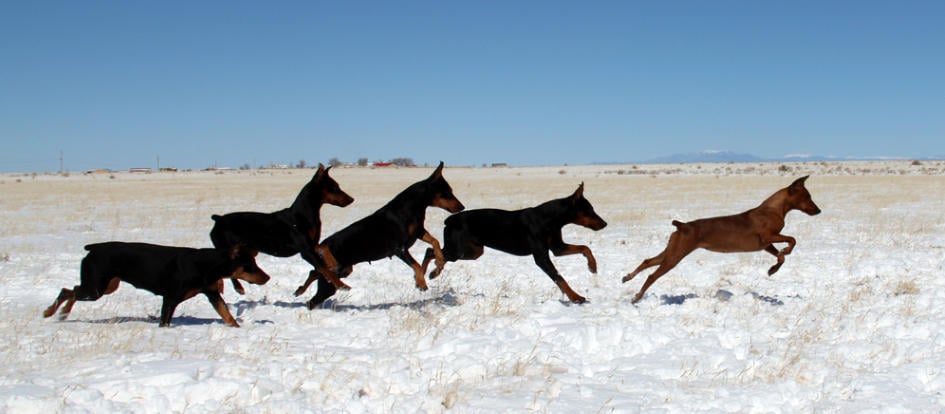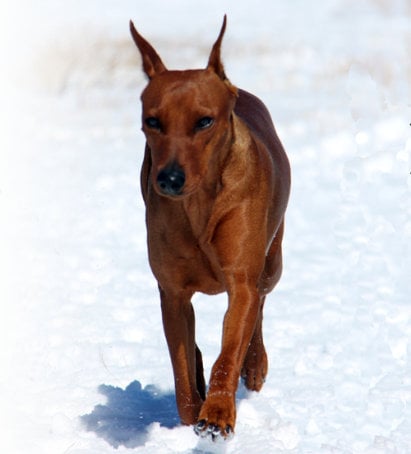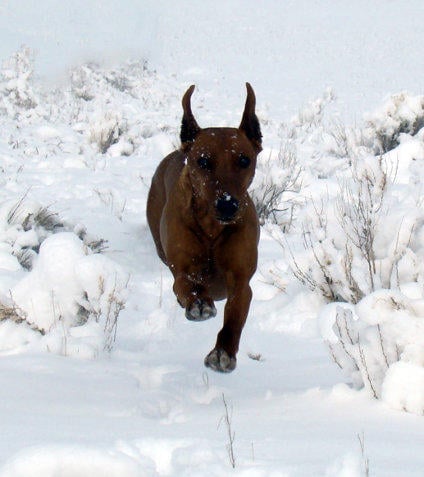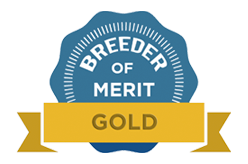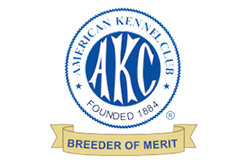German Pinschers are the “Medium Pinscher”. Larger than the Miniature Pinscher (MinPin) and smaller than the Doberman Pinscher (Dobe). The German Pinscher is in fact an older breed than both the minpin and the Dobe and probably contributed to development of those breeds. The German Pinscher is actually thought to be most related to the Standard Schnauzer. The two breeds were bred together up until the late 1800’s with litters including both the wire hair and smooth pinscher (todays Standard Schnauzer and German Pinscher).
Intelligent, loyal, intense, inquisitive & loving. These dogs LOVE their people. They want to be with their humans all the time. When you relax, they relax, when you go to the kitchen, they go to the kitchen. If you are looking for a little loyal shadow this breed may be for you! They can be prone to separation anxiety due to the intense bond they have with their people so care must be taken to teach the dog to be left alone. They also can become protective of their people so early socialization is a must.
Grooming Requirements: Nail Trimming weekly. Bath as needed. This is NOT a high maintenance grooming breed, but they do shed small hairs and are NOT considered a hypoallergenic breed.
Exercise Requirements: Medium - Good 1 hour walk a day or a fenced yard to play in.
Training Requirements: High - This is a more dominant breed and it is important they understand the order of the pack (humans are leaders). They do need mental stimulation in the form of training and also human affection, exercise and play.
The average cost for a well bred puppy in the USA is about $2,000-$4,000. Adults are sometimes available at reduced adoption fee. By “well bred” I refer to puppies out of Champion, health screened parents, from breeders who are members of the German Pinscher Club of America.
German Pinschers are generally a healthy breed. They do not suffer from the health concerns that the Dobermans do & are generally an all around healthy dog. You always have the best chance at getting a healthy companion by purchasing your puppy from a breeder that health screens their breeding dogs. Healthy parents have the best chance at producing healthy offspring! All breeding animals should have their hips evaluated by the OFA (Orthopedic Foundation for Animals), Eyes evaluated yearly by the OFA, a cardiac exam by a specialist or by an echo, & vWD status determined. The most widespread health concern in GPs is Juvenile cataracts. It is recommended breeding dogs have eye exams yearly and if an eye problem if found the dog be removed from a breeding program. Vaccine reactions are also common in this breed. A reaction can occur up to 14 days post vaccination and symptoms include staggering, head bobbing, & seizure type fits. This is often misdiagnosed as a poisoning. The treatment is normally steroids and if treated in time the prognosis is good!This breed is generally healthy but purchasing a puppy from health tested parents is still important!
German Pinschers can be a great family dog. They can be good with children. The older the children the easier the match will be. It is always best to start with a young puppy and raise your puppy with your children. The children have to be respectful of the dog as GPs will not tolerate harsh treatment. There are many breeds of dog that are more ideal & recommended for young children. If you are dedicated to socializing your dog and teaching you child proper treatment of animals then the combination of a GP & children can be a perfect one!
German Pinschers can get along with cats and other pets. It is best to start with a young puppy and raise your puppy with the other pets. It is would be important to inform your breeder of the other pets in the household and make sure the puppy seems suitable to get along with other pets
Behavior problems in any dog are always easier to prevent & resolve when the dog is young. The more quickly a problem is addressed, the more quickly & reliably the the behavior will be resolved. Allowing a behavior to develop & escalate over time can lead to a problem that will be very difficult to train out. The following are a list of common behavior problems in all dogs and what you can commonly expect in a German Pinscher:
Barking: GPs are not at yappy dog. They do NOT bark just to bark. If they bark there is a reason. If locked away from their people & not given proper attention a GP can be a problem barker but if properly cared for GPs only bark when necessary.
Digging: GPs are diggers. They love to do it & are great at it. It is part of their vermin hunting instinct.
Potty Training: GPs are normally very easy to potty train if you are consistent with training them. I recommend crate training puppies. GPs are clean dogs and do not like to get dirty.
Jumping: Due to their medium size they do tend to jump up on you to get closer to you. They are also very excitable and jumping is in their nature
Chewing: GPs do some chewing as puppies but if trained and given proper chewing items they are generally not destructive chewers as adults.
Note: The information provided is from our experience with our own German Pinschers. It is not a substitution for professional help if you are have difficulties with your German Pinscher. It is important that each dog be treated as an individual, dealt with & placed in homes accordingly. Please talk with your breeder about his/her dogs and what to expect from the bloodline. Even littermate puppies can vary in temperament so it is important to express expectations to your breeder.

